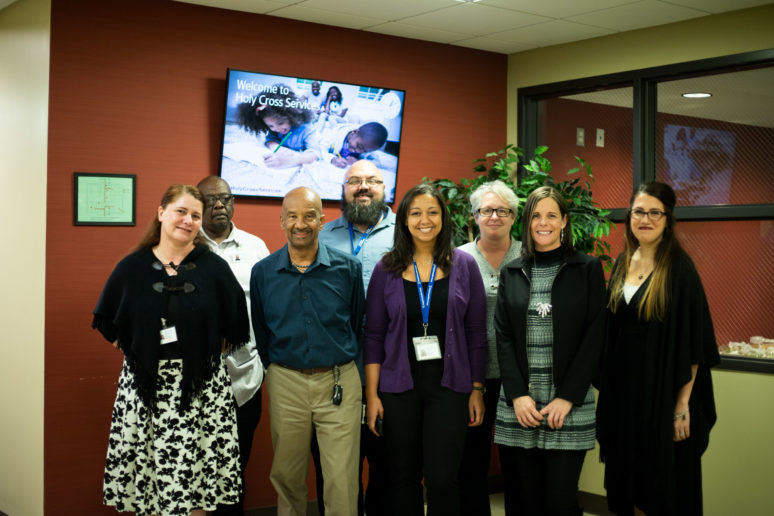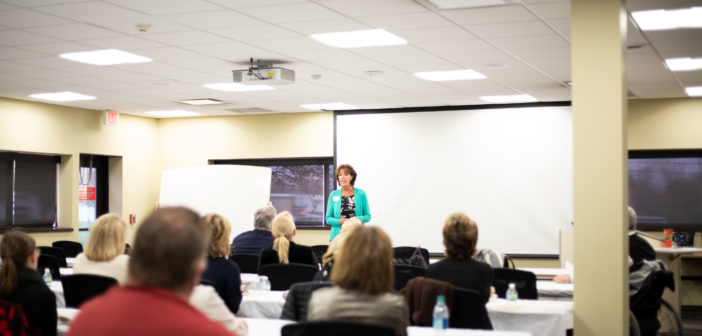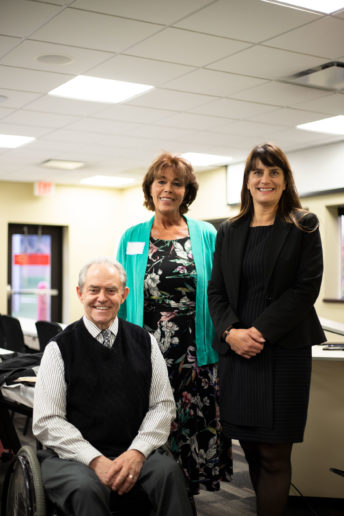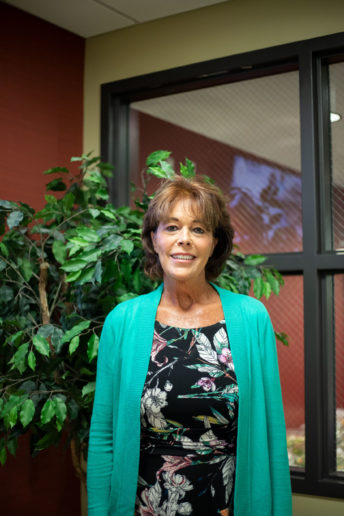Holy Cross Services, located in Flint Township, is a nonprofit organization that provides a full network of mental health, substance abuse, homeless and children’s services. Its vision: “To live in a world free of abuse, neglect, trauma and addiction.” The organization has various locations in Michigan.

HC Services staff (L-R): Amee Briney, Daniel Ireland, Philip Mosby, Jason Dasky, Katrina Edmon, Michelle Clark, Amy Savage, Anna Dillaway
So, what is the biggest issue facing the organization in the Greater Flint area? “Addiction,” answers Sharon Berkobien, President and CEO of HCS. “Substance abuse – addiction to alcohol, opiates, heroin and crack – everyone knows someone whose life has been impacted by substance abuse in one way or another.”
And, substance abuse affects every aspect of a person’s life – it destroys families and impacts employment and communities, the CEO reports. “People who are addicted don’t want to be addicted. It takes them over and affects their ability to make wise decisions. It impacts their physical health and mental well-being.”
Many HCS clients are struggling in their battle with substance abuse, trying to bring back their health, stay in recovery, get housing and regain custody of their children, Berkobien states. And, sometimes it doesn’t work the first time around. “They have to go back out – for one last drink, one last drug – and the cycle starts all over again. But we tell them, ‘Don’t stop fighting. You are worth it’.”
Addiction affects the entire family. It can be extremely painful for parents to watch a child who is struggling with substance abuse. “Family members need just as much help as the addict,” Berkobien adds.
HCS offers a variety of addiction treatment services, including: Detoxification, Residential Substance Use Disorder Services, Treatment, Outpatient Substance Use Disorder Services, and Recovery Housing. To treat clients, the staff uses a variety of therapy models – motivational enhancement, transtheoretical change, and cognitive behavioral therapy, as well as a spiritual aspect. “Our treatment is comprehensive of the individual as a whole,” explains Berkobien, “not just the addiction.”
The Corcoran House, a treatment facility for women, allows a resident’s children to be a part of the recovery process. “Parents and pregnant women have more problems when recovering,” Berkobien says. “Caring for children adds a different level of stress.” And while the typical time in treatment is 21-28 days, women with children in their care can stay as long as 60 days.
When they have finished residential treatment, women can continue in outpatient treatment as long as necessary and can commit to attending Alcoholics Anonymous or Narcotics Anonymous meetings, Berkobien reports. But she believes 21-28 days in treatment isn’t always enough. “The pattern of addiction doesn’t change overnight,” she admits. “It’s almost impossible to recover in just 21-28 days, which is the length of time a health insurance provider may usually cover. Sometimes, it takes a lot longer to change addictive patterns and behaviors.” Also, other life patterns need to change, such as learning to eat healthy. “It’s a lifetime commitment of change for health and wellness,” she states.
Outpatient services are available for men, women and adolescents at the Corcoran House. Residential treatment is available for men at the HCS Saginaw location and at recovery houses for men in the Flint area. “Substance abuse costs addicts their family, job, housing – everything!” Berkobien exclaims. “Some men need extra help to maintain sober living.”
“Addressing the opioid crisis in Flint will contribute to the city’s recovery. We need whole, healthy people to give back to the community, and we can do it. We can all get better together.”
Sharon Berkobien, LMSW, CDACC
President/CEO, Holy Cross Services
At the recovery houses, men recovering from addiction can stay for up to one year, to help them return to a normal life while maintaining sobriety. “It helps them rebuild their lives,” Berkobien says. At any given time, there are usually 12-24 recovering addicts staying in the recovery houses, she reports. “There isn’t as much need for women’s housing as there is for men. It’s a fight – an ongoing, lifetime struggle.”
HCS has been operating in Michigan for many years, and came to this area in 2013. The organization recently moved from Flushing to a Miller Road location, which is also a training facility. An open house was held on November 1 at the new location, with the purpose of not only raising awareness of substance abuse and mental health issues, but also to expand and build community partners.

Flint meet & greet planning committee (L-R): Mike Leoni, Marty Corcoran, Joanne Hamo, katie leoni, steve landaal
According to Berkobien, the City of Flint has been going through a revitalization period. And what HCS is doing – helping those who struggle with addiction – coincides with Flint’s own revitalization, she believes. “Addressing the opioid crisis in Flint will contribute to the city’s recovery. We need whole, healthy people to give back to the community, and we can do it. We can all get better together.”
For those who struggle with addiction, Berkobien strongly advises they pick up the phone. “Call and ask for help. It’s time to take back control of your life.”
History of Holy Cross Services
 Founded in 1948 as Boysville of Michigan, HCS has grown from one site to 20 and continues to provide hope and healing to children, adults and their families. HCS is one of Michigan’s largest private, not-for-profit providers of child and family welfare services, as well as behavioral healthcare services.
Founded in 1948 as Boysville of Michigan, HCS has grown from one site to 20 and continues to provide hope and healing to children, adults and their families. HCS is one of Michigan’s largest private, not-for-profit providers of child and family welfare services, as well as behavioral healthcare services.
Spirituality drives the mission, yet Holy Cross serves all people regardless of religious beliefs, ethnicity or race. All HCS programs and treatment services provide evidence and researched-based therapy and are not religion-based. The organization believes that spiritual guidance helps with overall wellness and healing, and offers it to those who choose it.
HCS touches the lives of approximately 1,500 Michigan people every day who are abused, neglected, traumatized and/or suffer from substance abuse and mental health issues. HCS employs about 400 workers who are dedicated to helping people become healthy, whole and self-sufficient. The mission of Holy Cross Services is to bring hope, promote change and help children and adults live free, healthy and productive lives.
Photography by Kayce McClure










